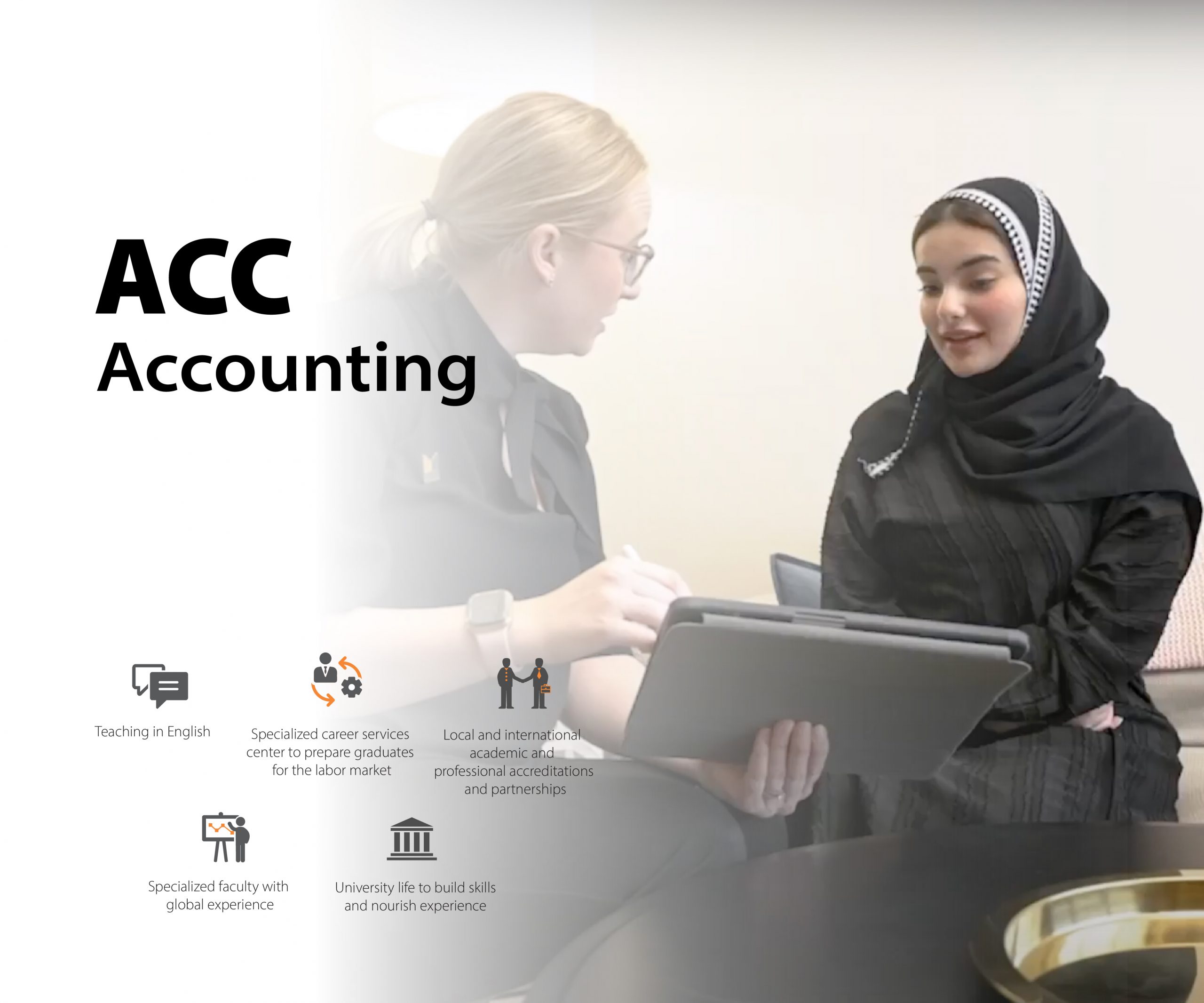Course Description of the Accounting Major Core Courses
ACC 311: Intermediate Accounting I (3-0-3)
The course provides students with the fundamentals of financial reporting, accounting framework, concepts, and measurements. As well, the course covers financial statements and the reporting, measurement, and recognition of assets, liabilities, revenues, and expenses. In this course, students will study the measurement, recognition, and reporting of inventory, accounts receivables, cash control, the acquisition and disposition of plant assets, and their depreciation, depletion, and impairment. Accounting for intangible assets, their recognition, amortization, impairment, and disposal. Accounting software packages, such as Excel, Tableau, and other computer applications are essential components of the course. Prerequisite: ACC 201.
ACC 312: Cost Accounting (3-0-3)
Emphasizes contemporary topics in strategic cost management through an understanding of the underlying concepts and fundamental techniques involved in cost accounting for manufacturing and service companies. Topics include job costing, process costing, joint and by-product costing, activity-based costing, budgeting, transfer pricing, cost-benefit analysis, cost estimating using a learning curve, target costing, and costing system design for real-life manufacturing and service organizations. Software applications, such as Excel, Tableau, and other data analytics techniques are integrated into the course activities. Prerequisite: ACC 202.
ACC 321: Intermediate Accounting II (3-0-3)
This course provides students with a comprehensive understanding of the liabilities, contingencies, and equity side of the balance sheet. In this course, students will study current liabilities, long term liabilities, such as bonds payable, long-term notes, debt restructuring, and stockholders’ equity. As well, it covers earnings per share: both basic and dilutive EPS (dilutive securities), complex financial instruments, income taxes, pensions and postretirement benefits, operating and capital leases, accounting for changes in accounting methods and accounting error correction, and statement of cash flows and its components. The course incorporates data analysis and visualization packages, such as Excel, Tableau, and other software applications into the course activities. Prerequisite: ACC 311.
ACC 326: Zakat and Tax Accounting (3-0-3)
The course provides students with a comprehensive understanding of basic concepts, theories, rules, and regulations that govern Zakat and income taxes in Saudi Arabia. In this course, students will be equipped with the knowledge and skills necessary to plan, assess, and compute income tax and Zakat base for business entities. As well, the course will cover other applicable taxes, such as VAT, foreign corporate tax, and others. After completing this course, students will be able to prepare the zakat and tax return according to the applicable Zakat system and income tax laws in the Kingdom. Data analysis and visualization software, such as Excel, Tableau, and other computer applications are integrated into the curriculum activities. Prerequisite: ACC 321.
ACC 418: Advanced Financial Accounting (3-0-3)
The course provides students with concepts and frameworks for mergers and acquisitions accounting and consolidated financial statements. It equips students with the knowledge and skills required for accounting for equity investments, mergers, acquisitions, and financial consolidation. It provides detailed treatments of intercompany transactions and other consolidation reporting issues, such as foreign currency transactions, and consolidation of the foreign subsidiary operations and financial statements. Data analysis and visualization applications, such as Excel, Tableau, and other software tools are integrated into the course activities. Prerequisite: ACC 321.
ACC 430: Auditing and Assurance Services (3-0-3)
This course explains the critical responsibility that auditors play in companies and capital markets. It helps students develop the critical eye and knowledge necessary to challenge and assess the effectiveness of a company’s internal control and risk management. It discusses the audit process, planning, program design, evidence collection, and audit reports. The course stresses the critical role of ethics in the accounting profession and the ethical standards that guide audit practitioners. As well, it highlights some analytics tools and data analytics techniques that help determine which techniques are most appropriate for the objectives of a given analysis. Prerequisite: ACC 418.
ACC 498: COOP Training Internship (6-0-6)
The coop is an internship training that is required for all business students, and it is an integral part of their BSBA degree requirements. It is intended to bridge the gap between theory and practice and provide business students with a hands-on experience in their field of study. In the coop training, business students will have the opportunity to apply theories, models, and knowledge that they have learned throughout their undergraduate program to real-world environments. This will sharpen their skills and enhance their chances to land permanent quality employment. Prerequisite: 120 Credit Hours.
Course Description of the Accounting Major Elective Courses
ACC 416: Internal Audit and Control (3-0-3)
This course focuses on the development and evolution of the internal auditing profession; objectives of internal auditing; standards of professional practice; techniques of internal auditing; internal audit and control. It also includes the internal audit process; reporting of internal audit findings; administration of internal audit departments and quality assurance; relationships between internal and external auditors, and audit committees; ethics in internal auditing; financial and management audits; compliance audits, and computer applications in internal auditing. Other data analytics and visualization applications, such as Excel and Tableau are integrated into the course activities. Prerequisite: ACC 321.
ACC 421: Advanced Topics in Taxation (3-0-3)
The Advanced Topics in Taxation is designed to provide accounting students with advanced knowledge, skills, and expertise in selected topics in business taxation, such as value-added tax (VAT), income taxes, international taxes, tax withholdings, tax planning, and tax avoidance, and other forms of taxations applicable in Saudi Arabia. The course will examine the Saudi tax laws and regulations in the context of contemporary theoretical and policy challenges, such as taxation in the era of the digital economy and multinational context. Students will work on practical tax law problems and key tax cases. The course incorporates data analytics techniques, tools, and visualization, such as Excel and Tableau software into the class activities. Prerequisite: ACC 326.
ACC 424: Accounting for Government and Non-Profit (3-0-3)
The course covers financial reporting for the public sector and non-profit entities, such as universities and charitable organizations. The course provides students with relevant knowledge, concepts, and theories that apply to the public sector and none for profit organizations along with the International Public Sector Accounting Standards (IPSAS) and how they are applied to governmental units and non-profit entities. Data analysis and visualization applications, such as Excel, Tableau, and others are integrated into the course activities. Prerequisite: ACC 321.
ACC 428: Advanced Management Accounting (3-0-3)
Examines advanced and contemporary issues in cost management and management control with emphasis on industrial and business practices. This course covers the decision-making process and analysis, strategic cost management; operational efficiency and business process performance; planning, budgeting, and forecasting; it also introduces the Balance Scorecard as a tool for measuring managerial performance and includes inventory planning and control, and Capital Investment Appraisal. The course integrates data analysis techniques and visualization packages into its activities. Prerequisite: ACC 312.
ACC 432: Financial Statements Analysis and Valuation (3-0-3)
The course provides students with a comprehensive understanding of financial statement analysis fundamentals and equity valuation. Equipped with such knowledge and skills, students will be able to assess the past performance of a company, determine the quality of its earnings, examine the underlying accounting assumptions of its major assets and liabilities, determine its current financial position, forecast its future cash flows and estimate its intrinsic value. In short, this equity valuation course builds its model using the financial data of publicly traded Saudi companies. The course builds its valuation model using Excel analytical applications and the Tableau visualization package. Prerequisites: ACC 321.
ACC 434: Accounting Information System (3-0-3)
This course introduces students to the basic concepts, objectives, and components of Accounting Information Systems (AIS) and their applications in a business. It introduces the techniques of documenting accounting systems and database modeling tools. The course covers in-depth the common feature of transactions processing and reporting system. As well, the course integrates some selected accounting software along with Excel and Tableau packages that allow students to apply the AIS concepts to practice. Prerequisite: ACC 321.
ACC 440: Accounting Theory and Practices (3-0-3)
This course is designed as a capstone overview of the development of the accounting conceptual framework, theoretical models, and professional literature of financial accounting. The course will examine the nature and function of theories and their applications to accounting development and practices. The course will focus on selected topics and issues in accounting, such as interpreting specific accounting literature, income measurement, asset measurement and valuation, and measurement and valuation of complex financial instruments, accounting ethics, and other contemporary issues in accounting. Prerequisite: ACC 321.


